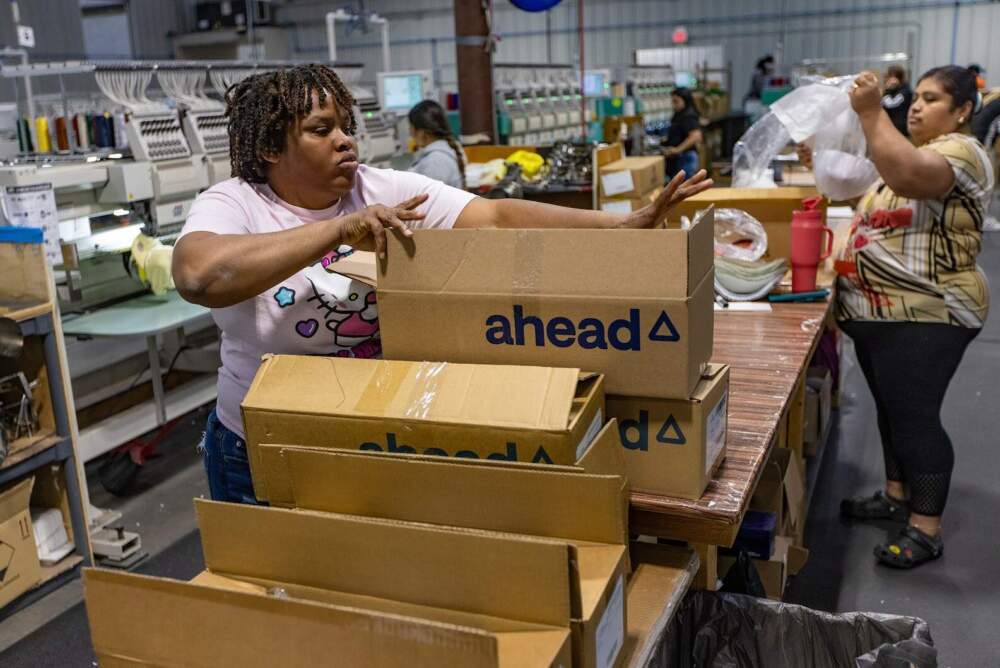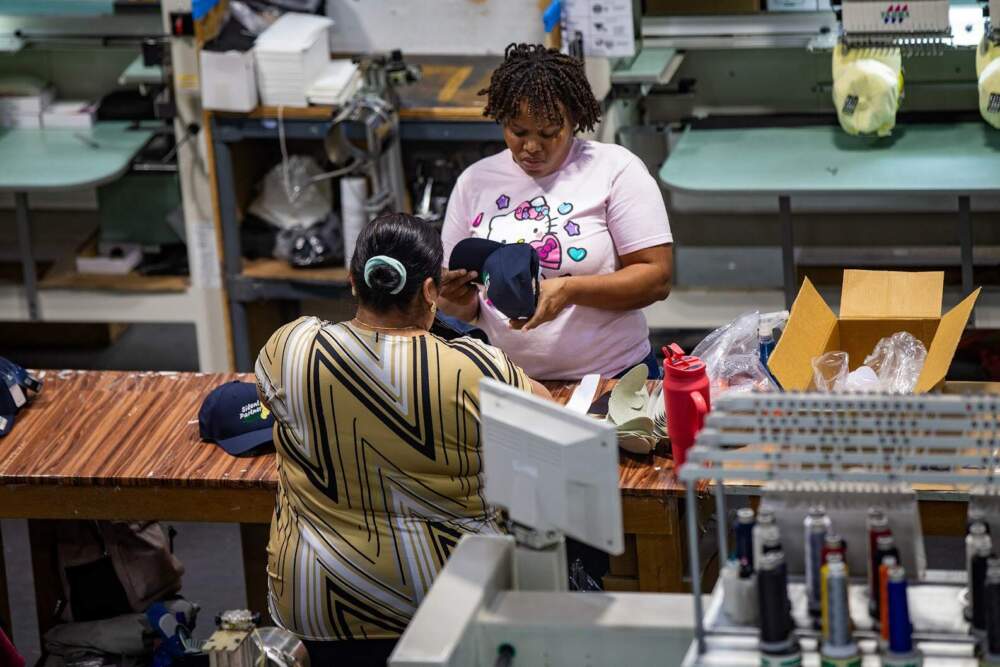Immigrants Want Faster Permission to Work. So Do Mass. Leaders and Businesses
April 17, 2024 By Anthony Brooks

The factory floor of the New Bedford-based company Ahead is as big as an airplane hangar. On a recent morning, it hummed with machines stitching colorful logos onto golf hats, jerseys and windbreakers, generating a racket like a passing freight train.
Musette Jean-Pierre, a recent immigrant from Haiti, helps process orders, ensuring the hats are properly finished before she packs them in clear, plastic bags. She said she fled Haiti’s political and economic turmoil in 2015 for Brazil and arrived in Massachusetts a year ago with her husband and two children.
While she awaits her immigration hearing, Jean-Pierre and her husband applied for and received authorization to work, which allowed them to move out of a shelter and into their own rental in New Bedford.
“I want a lot of things for my future,” Jean-Pierre, 40, said through an interpreter. “But I’m going to start slowly, step by step, until I get there.”
Ahead employs about 200 people, 60 of whom work in the manufacturing facility, and who are predominantly immigrants. Some have been here for years, while others, like Jean-Pierre, have just arrived. Like many Massachusetts companies, Ahead is glad to have them. It’s an economic reality that’s often missed in the political debate as more immigrants arrive in the state.
The production team at Ahead is made up of workers from Haiti, Brazil, Portugal, Guatemala and Colombia. “That’s what America is all about,” according to Gorete Silvia, a production supervisor, who said that with golf season heating up, the factory will soon be operating six days a week. “We’re always busy,” she said.

The recent wave of migrants from the southern border is putting financial pressure on many states, including Massachusetts. State officials and advocates for immigrants say one key to relieving that pressure is to speed up the path to work. Work authorization not only helps the migrants, but also helps companies like Ahead, which need workers.
But getting those work authorizations can be painfully slow, sometimes taking as long as 18 months. According to Gov. Maura Healey’s office, about 11,000 immigrants entered the state last year. Only a fraction of them — about 2,700 — have work permits. And an even smaller number — just over 500 — have been placed in jobs so far.
“It has been so frustrating over the past several months,” said U.S. Sen. Elizabeth Warren, a Democrat who, along with Healey, has been urging the Biden administration to speed up the process.
Warren said that she has talked to migrants who are “desperate to work,” and to employers who need workers, “but we can’t get them together because federal law has blocked it.”
She said the federal government is now taking action to shorten the time it takes to get work permits; state officials say, in some cases, it can be as quick as three weeks. And earlier this month, the Biden administration announced that for those migrants already working, permits that normally expire after two years will be extended by a year-and-a-half.
Warren said that means “they can keep right on working,” while they wait for their immigration status to be resolved.

That’s good news for people like Roberto Vincent, also from Haiti, who arrived in Boston last year determined to work and support his wife and two children while the family’s immigration case is processed. He landed a job at the Brazilian Worker Center in Boston, which helps migrants connect with legal help, shelter and work.
Vincent, who says he endured a trek through the forests of Chile with his family before reaching the United States, said he is now “muy feliz” to have a job.
“I am very, very happy,” he said in English. Then, speaking through an interpreter, he added that he’s so pleased to be working that he’d like to keep this job forever. His next goal is to find an affordable apartment, so that he can move his family out of the shelter they’re currently living in.
State lawmakers are looking to limit families to nine months in publicly funded shelters, as Massachusetts grapples with growing numbers of immigrants and local families who are homeless. In November, the governor imposed a cap of 7,500 households in the shelter system for the first time. The Legislature projects that the cost of sheltering people will reach nearly $1 billion a year.
The migrant housing crisis is fueling Republicans’ criticism of the Healey administration. Amy Carnevale, chair of the state Republican Party, is not persuaded that faster work authorizations will solve the whole problem.
“Migrants are continuing to come into Massachusetts at an expedited rate with no long-term solution in place,” she said. In her view, the state’s right-to-shelter law, which guarantees housing to families in need, is the underlying problem — because it makes the state an attractive destination for immigrants.
“We think the fundamental law guaranteeing the right to housing to migrants needs to be amended to impose a residency requirement,” she said.

But rather than focus on the cost of the current migrant wave, advocates point to what immigrants contribute over the long term. Warren argues that welcoming immigrants and expediting work permits is good for Massachusetts.
“This is more people to do the jobs, but it’s also more people who are spending money in the stores and more people who are paying taxes,” she said. “This is good for our economy.”
Cristina Aguilera, executive director of the Office for Refugees and Immigrants in Massachusetts, said she hears the same message in every conversation she has with migrants: “We want to work. Help us get there.”
Aguilera said the vast majority of migrants are in Massachusetts legally, awaiting immigration and asylum hearings, which in some cases are scheduled for years from now. She said authorization to work is the key to moving them out of an overburdened shelter system, and into a workforce that has big needs.
“It’s a win-win situation,” she said. “Because these individuals that are here, with a broad range of skills, can really fill those gaps.”
Back in New Bedford, Tracy Silvia, head of human resources at Ahead, says immigrants like Musette Jean-Pierre are a key part of the company’s success.
“The people out on the floor are the heart of the operation; without them, we can’t get our product out the door,” Silvia said. “They don’t deserve the reputation or bad rap they get for being immigrants.”

For her part, Jean-Pierre said she likes her job because she’s learning new skills — and she’s determined to keep working.
“I’m here to stay unless I get kicked out,” she said with a laugh.